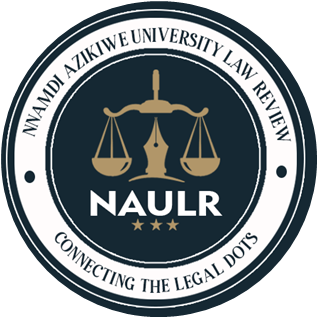About us
The Nnamdi Azikiwe University Law
Review (“NAULR”) is an independent student-run journal publication established
in 2019 in the faculty of law of Nnamdi Azikiwe University, by her law
students. The review is a law journal publication which aims at national and international
audience. As communicating
research findings through the internet, journals and other publications continue
to sit at the heart of any research enterprise, the review devotedly occupies a
pride of place in the legal literature.
The review is positioned to
strategically addressing the core educational and socio-economic needs of law
students in Nigeria and by extension the profession as a whole, especially in
the light of the ever changing variables in the world today. Basically, we
conduct legal researches; run an online platform where we invite, review and
publish opinion on cutting-edge areas of law authored by the leading global
stakeholders in the legal profession -including justices, practicing lawyers,
professors, the academia and distinguished law students alike; aggregate
knowledge on critical legal issues of the day; and write legal commentaries of
both national and international significance.
As the Return on Investment (ROI)
in formal education is being threatened globally, our vision is calculated to developing
legal minds that properly fit into the contemporary legal industry and can
contribute to the ultimate improvement of our foremost noble profession. Also, by enshrining legal works and commentaries
that are highly knowledge based, timely and obtained from leading stakeholders in
the profession, we aim to be of great service to the profession and all
students of law – provide better, wider and faster access to research
publications.
The review is run by the
editorial board (consisting entirely of distinguished law students), and when
necessary, in conjunction with the committee-of-councils who serve as an
advisory body. The process for each
article is objective and consists of three stages; the fact-check or research
stage, the content-editing stage and the synchronization stage. Each article is reviewed in line with the
review’s anonymity and confidentiality policy; where the author of each article
to be reviewed remains anonymous and the contents of the article thereto remain
confidential until the end of the review process if the article is approved for
publication.
Mission
The founders
of the review have developed a four-fledged goal, around which, the activities
of the review centrally revolve. These goals are captured below;
1. To improve the quality of legal
education by equipping students with the quintessential legal writing and
research skills.
2. To expose students to practice areas
on emerging legal trends.
3. To serve as a legal research tool
of information and exposure to the legal community and otherwise.
4. To simplify the understanding of
law to the common man as the law consistently remains a veritable tool in every
society
Membership
Gaining
membership into the review is based solely on the performance of prospective
students. The review admits only of exceptional students who are successful at the
Membership Entrance Assessment (MEA) which is based on policies existing at the
material time. The MEA is conducted annually every academic session to usher in
a transition from the existing editorial board to new editorial board members
for each new issue of the review publication. We strongly encourage all
students to apply or participate in MEA and afford themselves a membership
opportunity.
Upon
the selection of successful students, such students are awarded provisional
admission into the review until their completion of the compulsory one-week
on-boarding orientation. The on-boarding orientation involves special packaged
trainings and master classes about the review and certain outlined areas. This
is in line with values of the review in reinforcing efficiency and
professionalism. The welfare of each member of the review is of paramount
concern; at the fore are strategies geared at improving their knowledge base,
all the reason 65% of the review budget goes to research schemes and other
schemes incidental thereto.
